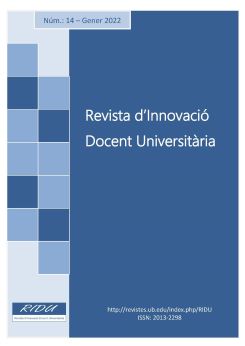Argentina in the 90s: gamification as a strategy of learning in economics teaching
DOI:
https://doi.org/10.1344/RIDU2022.14.4Keywords:
Active learning, Gamification, Teaching in EconomicsAbstract
This paper presents an experience of using gamification as an active learning strategy in the classroom in an advanced course of Latin American Economics, as part of the Degree in Economics from Universidad de la República, Uruguay. It is an innovation based on previous experiences, that was applied during the 2021 academic year simultaneously on different seminar groups. The simultaneous application of the activity was crucial as it allowed for adjustments in advance of the activity itself and the joint evaluation with both our colleagues and the students. The opinion of the students was very favorable regarding the use of this kind of strategies and provided inputs for its improvement.
References
Ashcraft, C.M. (2013) Win as much water as you can. Program on negotiation at Harvard Law School.
Azar, P., Román, C. (2019) Informe Comisión sobre Asistencia estudiantil. Instituto de Economía de la Facultad de Ciencias Económicas y de Administración - UdelaR, Montevideo.
Beltrán, A.M., Rivera, D.E., Maldonado, J.C. (2018) El valor de la gamificación como herramienta educativa. En: Gamificación en Iberoamérica. Experiencias desde la comunicación y la educación (pp. 97-111). Universidad Politécnica Salesiana, Quito.
Carbajal, F. (2016) Innovaciones en Educación en la Licenciatura en Economía. UdelaR., Departamento de Economía-Serie Notas de Enseñanza 03/2016. Disponibles en: http://fcea.edu.uy/ensenanza2/serie-notas-docentes.html [consultado: 30/11/2021]
Del-Valle-Mampel, A. (2012) Los Juegos de Simulación en la enseñanza de la Economía y Organización de Empresas. Tesis de Maestría, Universidad Internacional de la Rioja. Disponible en: https://reunir.unir.net/handle/123456789/580 [consultado: 1/12/2021]
Flavell, J.H. (1979) Metacognition and cognitive monitoring: A new area of cognitive–developmental inquiry. American psychologist, 34(10), pp. 906-911.
García-Ruiz, R., Bonilla-del-Río, M., Diego-Mantecón, J.M. (2018) Gamificación en la Escuela 2.0: una alianza educativa entre juego y aprendizaje. En: Gamificación en Iberoamérica. Experiencias desde la comunicación y la educación (pp. 71-94). Universidad Politécnica Salesiana, Quito.
Goinheix, S. (2021) Algunos recursos de aprendizaje activo para cursos universitarios, Departamento de Economía-Serie Notas de Enseñanza 08/2021. Disponible en: http://fcea.edu.uy/images/dto_economia/Documentos/Notas_docentes_Recursos_de_Aprendizaje_Activo.pdf [consultado: 30/11/2021]
Herrera, Y.R., Valdivia, P.Á., Alonso, S., Zagalaz, M.L. (2018) Metacognición y aprendizaje autónomo en la Educación Superior. Educación Médica Superior, 32(4), pp. 293-302.
Lozada, C., Betancur G. (2017) La gamificación en la educación superior: una revisión sistemática. Revista Ingenierías Universidad de Medellín, 16(31), pp. 97-124.
Lozano, S.I., Suescún, E., Vallejo, P., Mazo, R., Correa, D. (2020) Comparando dos estrategias de aprendizaje activo para enseñar Scrum en un curso introductorio de ingeniería de software. Ingeniare. Revista chilena de ingeniería, 28(1), pp. 83-94.
Mingorance, A.C., Trujillo, J.M., Torres, C. (2017) Mejora del rendimiento académico a través de la metodología de aula invertida centrada en el aprendizaje activo del estudiante universitario de ciencias de la educación. Journal of sport and health research, 9(supl 1), pp. 129-136.
Teixes, F. (2014) Gamificación: fundamentos y aplicaciones. Editorial UOC, Barcelona.
Toukoumidis, Á.T., Rodríguez, L.M., Rodríguez, M.A., Björk, S. (2018) Modelo teórico integrado de gamificación en ambientes e-learning (E-MIGA). Revista Complutense de Educación, 29(1), pp. 129-145.
Downloads
Published
Issue
Section
License
Copyright (c) 2022 Martin Olivera Bailador, Irene Centurión Cesar

This work is licensed under a Creative Commons Attribution 4.0 International License.
Authors whishing to publish in this journal agree to the following conditions:
- The author or author retain copyright and grants the journal the right of first publication of the paper.
- The texts will be published under license "Reconocimiento Creative Commons 4.0 España", which allows to share, distribute, reproduce and the public communication of the paper, as long as the name of the author or authors and the journal are clearly stated.







